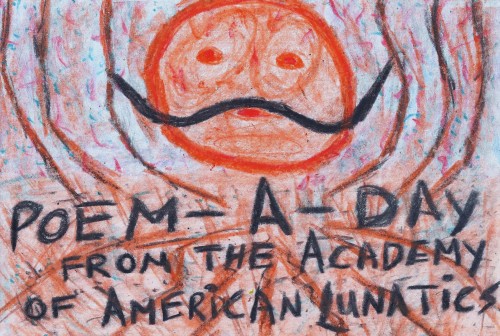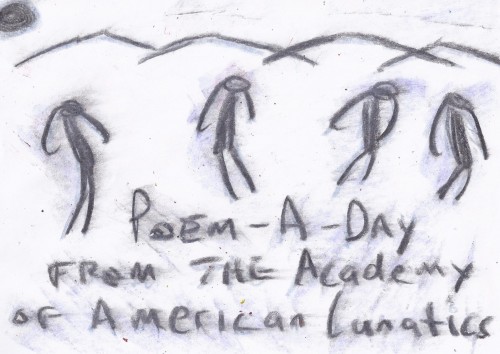POEM-A-DAY from THE ACADEMY OF AMERICAN LUNATICS (#10)

Sean Kilpatrick is currently writing an extended script for Out for Justice in which the villain, Richie, is not simply tossed at kitchen appliances with cheap judo, but has his bastardly say, including the following commercial stint
Ode to William Forsyth
by Sean Kilpatrick
I asked my friend Gerard Breitenbeck to portray sublime crack-smoking mafia rampage screen icon Richie, who is brought down way too quick by Steven Segal in Out for Justice. From an ode in progress honoring actor William Forsythe.
sublime crack-smoking mafia rampage screen icon Richie, who is brought down way too quick by Steven Segal in Out for Justice. From an ode in progress honoring actor William Forsythe.
note: I’ve started this feature up as a kind of homage and alternative (a companion series, if you will) to the incredible work Alex Dimitrov and the rest of the team at the The Academy of American Poets are doing. I mean it’s astonishing how they are able to get masterpieces of such stature out to the masses on an almost daily basis. But, some poems, though formidable in their own right, aren’t quite right for that pantheon. And, so I’m planning on bridging the gap. A kind of complementary series. Enjoy!
January 7th, 2014 / 10:14 pm
I AM A VICTIM I AM A VICTIM I AM A VICTIM I AM A VICTIM
I AM A VICTIM I AM A VICTIM I AM A VICTIM I AM A VICTIM I AM A VICTIM I AM A VICTIM I AM A VICTIM I AM A VICTIM I AM A VICTIM I AM A VICTIM I AM A VICTIM I AM A VICTIM I AM A VICTIM I AM A VICTIM I AM A VICTIM I AM A VICTIM I AM A VICTIM I AM A VICTIM I AM A VICTIM I AM A VICTIM I AM A VICTIM I AM A VICTIM I AM A VICTIM I AM A VICTIM I AM A VICTIM I AM A VICTIM I AM A VICTIM I AM A VICTIM I AM A VICTIM I AM A VICTIM I AM A VICTIM I AM A VICTIM I AM A VICTIM I AM A VICTIM I AM A VICTIM I AM A VICTIM I AM A VICTIM I AM A VICTIM I AM A VICTIM I AM A VICTIM I AM A VICTIM I AM A VICTIM I AM A VICTIM I AM A VICTIM I AM A VICTIM I AM A VICTIM I AM A VICTIM I AM A VICTIM I AM A VICTIM I AM A VICTIM I AM A VICTIM I AM A VICTIM I AM A VICTIM I AM A VICTIM I AM A VICTIM I AM A VICTIM I AM A VICTIM I AM A VICTIM I AM A VICTIM I AM A VICTIM I AM A VICTIM I AM A VICTIM I AM A VICTIM I AM A VICTIM I AM A VICTIM I AM A VICTIM I AM A VICTIM I AM A VICTIM I AM A VICTIM I AM A VICTIM I AM A VICTIM I AM A VICTIM I AM A VICTIM I AM A VICTIM I AM A VICTIM I AM A VICTIM I AM A VICTIM I AM A VICTIM I AM A VICTIM I AM A VICTIM I AM A VICTIM I AM A VICTIM I AM A VICTIM I AM A VICTIM I AM A VICTIM I AM A VICTIM I AM A VICTIM I AM A VICTIM I AM A VICTIM I AM A VICTIM I AM A VICTIM I AM A VICTIM I AM A VICTIM I AM A VICTIM I AM A VICTIM I AM A VICTIM I AM A VICTIM I AM A VICTIM I AM A VICTIM I AM A VICTIM I AM A VICTIM I AM A VICTIM I AM A VICTIM I AM A VICTIM I AM A VICTIM I AM A VICTIM I AM A VICTIM I AM A VICTIM I AM A VICTIM I AM A VICTIM I AM A VICTIM I AM A VICTIM I AM A
.
.
.
(sorry, guys — just warming up to write my “Memoirs”)
& Happy New Year
Inventory
I have been persuaded, by the comments of others, and by further reflection, that my initial reaction to the recent fustercluck, (i.e., “fuck this place”), was neither mature nor productive. And worse, some of what I said along the way was hurtful and ungenerous. If I value this space — and I must, because I am still reading, and certainly I did value it once — then I should be the change I want to see.
It has generally been my feeling that the sexism, racism, and general hatefulness of the HTMLGiant community has been consistently overstated, both because of the unfortunate human tendency to confuse the worst of any given group of people with the essence of that group, and because this blog, like any blog, seems to get the most attention when its contributors act out. That being said, I know for a fact that many women and people of color are not comfortable reading these pages. (There are times where I’m not comfortable either.) I don’t like that. I don’t think the vast majority of our contributors, current or past, like it either. So I’m going to try to address the problem head-on in a series of posts designed to make it clear that HTMLGiant is, as a whole, intended to be an inclusive environment. Again, I think that’s where our hearts (mostly) are. If you want to contribute something to this series, I’d be glad to have it, so please email me (at mike(dot)meginnis(at)gmail), because I don’t know what the next post is going to look like.
I’m going to start with myself. I’m going to inventory my privilege, insofar as I can do that. I can’t promise it will be entertaining, but hopefully it will continue the work that others have begun.
That’s it, this site is dead—I’m outta here
1.
There’s a lot of ego on display here and when I’m honest, I enjoy that. It gives this site much of its attraction: people post and comment here in the spirit of one-upmanship, calling attention to themselves. The stakes are real: get a lot of page views, get voted up a lot, and you might win a publishing contract! (I have.) In the increasingly impoverished world of indy lit, what could be better than a website where typing some words into a text field and clicking a button can make you a (virtual) celebrity? When I post and comment, I do so giddy with the realization that others are watching—others who might invite me to their parties, or to contribute to their literary journals. (Some have.)
2.
The indy lit blogosphere that we have made and are currently still making is as much about provocation as it is communication. Since its participants tend to be well-educated writers and artists, we tend to be good at provocation. We intend our comments and posts to make others think and feel differently—including, sometimes, negatively.
3.
I was born in a relatively sexist / racist / homophobic corner of the world (Scranton, Pennsylvania—represent), where I was raised by fairly liberal parents who mostly espoused views one might call progressive. Nonetheless I absorbed a lot of sexist / racist / homophobic ideology, because the culture surrounding me was largely sexist / racist / homophobic. I attended a Catholic grade school and high school, for instance, and became an Eagle Scout—and while I’m not trying to single out those institutions (which did some right by me), we didn’t exactly sit around reading bell hooks.
Regarding Free Speech, Community, and HTMLGIANT
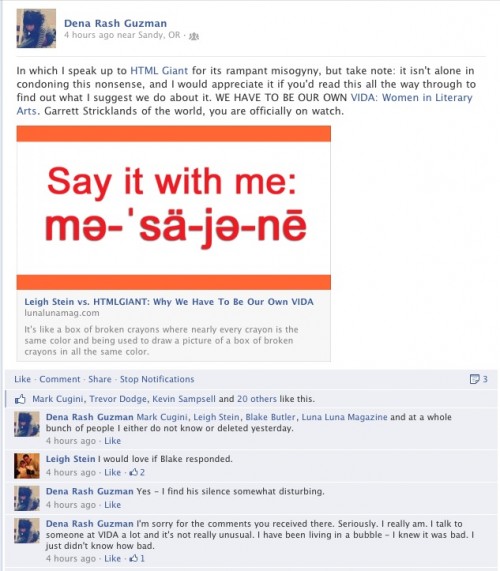
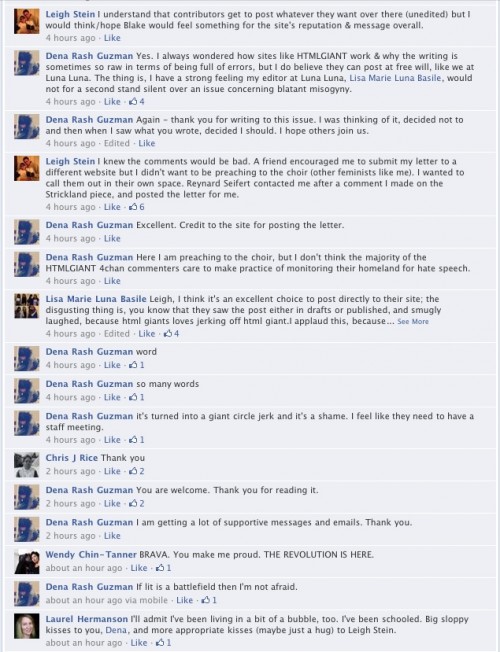
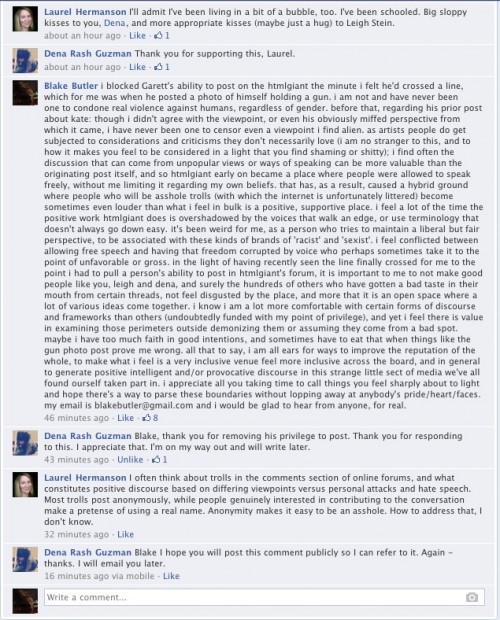
Please feel free to discuss below. Please act like a person.
In Conversation: Matthew Revert and Michael J Seidlinger
Matthew Revert: Who friended who? I don’t even know anymore.
Michael J Seidlinger: How the hell did we start talking to each other? At one point we were both strangers, completely invisible to each other. Hmm, I think what happened, on my end, is that I friended you and didn’t reach out and talk for a long time. I tend to do that.

MR: I remember you were posting about your insomnia, and being a fellow insomniac, we discussed it a lot.
MS: This is true. I am a raging insomniac.
MR: And I suggested you listen to earth2 by Earth. And friendship was born.
MS: And from there, it quickly spiraled into design. I think it was being mutually interested in graphic design that forged it.
MR: Design was the key. I’m not even sure if you knew I was a writer at the time.
MS: I actually did. I knew you were a writer. Ironically, I do remember knowing of you as a writer before the design.
MR: Oh? That actually pleases me.
MS: I think it was the book with all the people on the front, the carbon copies. A Million Versions of Right?
MR: Yeah, that was my first book. About to go out of print actually.
MS: Yeah, I bought that and read it and it wasn’t until we started talking about insomnia via comment threads and Facebook chat that I put the pieces together.
MR: Shortly after meeting you, I started investigating CCM and saw that you were a writer and also a designer. That parallel pleased me because I had always been shoved into the writer camp or the designer camp (increasingly the latter).
MS: Since taking over CCM, I’m setting all my books originally published on CCM out of print; ethical issue.
MR: Yeah. That makes sense. I worried about that with my first books for LegumeMan.
MS: Ah, so CCM led the way? It’s interesting to meet people that knew of the press before they knew of me.
MR: Yeah. Pretty sure it did. And I purchased My Pet Serial Killer. And really enjoyed a lot of your CCM design work.
MS: That gets me to thinking…
MR: Yeah?
MS: How we’re both writers and designers. I do believe that you and I were writing the books at the same time, the books that we’re talking about.
MR: As in, when we first met, you were writing Laughter of Strangers and I was writing Basal Ganglia?
MS: I recall writing Laughter of Strangers around the time you were revising and “going under” and really getting into the thick of it with Basal Ganglia. We were already talking, but it wasn’t until that time that we started talking on a daily basis.
MR: Yeah. We were both working on our books. Did we know, at that time, they would both be released by Lazy Fascist in the same batch?
MS: That’s interesting. I don’t think so. I could be wrong but I do recall having many a late night talking craft.
MR: Yeah. We unloaded our various frustrations and triumphs on each other.
MS: Good days and bad: We discussed them all.
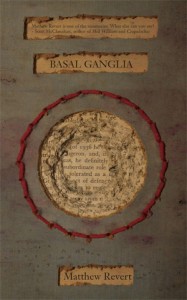
MR: Basal Ganglia was a very difficult book for me to write so there was a lot of ennui. How long did it take you to write Laughter of Strangers? You write much faster than me, I think.
MS: It took me about 3 or 4 weeks.
MR: Hahahaha. Basal took me 18 months and is half the length. You’re a machine.
MS: I think I write fast because I’m afraid of staying with a book for too long. As a result, I become consumed by the project. How many drafts did you have for Basal?
MR: Yeah, and that clearly works for you. I mean the end result says it all. I had upwards of ten false starts. I turn my book into a year-long lifestyle.
MS: So you “live” the novel—that’s awesome. Do you have any specific quotas/rituals?
MR: Getting right down to it, I started writing Basal Ganglia as a response to cognitive therapy I was undergoing. I wanted to understand that experience. That’s how it tends to be for me. I am responding to something that has happened. Something that has led to significant change within me.
MS: From the beginning, the book delved right into the cerebral.
MR: Yeah, I’m in that place. I tend to live the book for long periods. Gradually eking it out.
MS: So you sort of have a period of “making sense of it?”
MR: Yeah. And that period often maintains well into the process, but as a result of that, it only had two drafts. My first draft is very close to the final draft. But Basal Ganglia was a real puzzle to figure out and I wanted to understand as many pieces of that puzzle as possible before I started writing it.
MS: I’m personally interested in the part of the writing process that involves not the initial process, or drafting, but rather how an idea becomes something more organic, something real. It’s interesting to see how you turned the book into a puzzle given how you were looking to make sense of a puzzle. You crafted a puzzle to make sense of a personal puzzle.
MR: It seems to me that so much of the energy in Laughter of Strangers would come from the way you’re able to almost purge the book in a shorter space of time.
MS: I believe I’m beginning to see that, yeah. I have this compulsion to chase after the perceived momentum of a piece. Everything hinges on the first 2 days of writing—that two-day stretch sets the pace. Most of the time, I write approximately 3000-5000 words, have the general structure and feel of the book. I’ll know where it’s going; from there, it begins to consume me. I can’t stop thinking about it. It follows me throughout my days. As a result, I write faster. Maybe it really does show itself in the stuff I write.
MR: Before I started writing Basal Ganglia, I knew I wanted it to be set in the human brain, with the “basal ganglia” of the title becoming the only characters within that brain.
MS: Do you outline, or plan out anything conceptually?
MR: Not on paper, no. I usually start writing a random chapter. I think the first part of Basal I wrote was chapter 7. This sounds kind of wonky, but the only real planning I did outside of my head was to have a print out of the human brain’s anatomy on my writing desk. I circled a part of the brain and said, ‘okay… now write this’.
Two Lines Press: Interview w/ Scott Esposito
HTMLGIANT recently featured a review of The Fata Morgana Books by Jonathan Littell, published by the fantastic Two Lines Press that is bringing some splendid international works into English. I had a chance to ask Scott Esposito some questions about the press.
***

Janice Lee: What is Two Lines Press and what sets it apart from other publishing projects?
Scott Esposito: Two Lines Press is a nonprofit publisher of exclusively literature in translation. We’re akin to a number of nonprofit translation publishers (e.g Archipelago Press, Open Letter Books), but I think there are a few things that set us apart.
First off, I’m not aware of anything like us in the San Francisco Bay Area (where we’re headquartered), which I think is significant. We do a number of events in the community each year, and we’re in contact with some of the best local bookstores. I think it’s an important thing to have a press like us pushing the translation line around these parts.
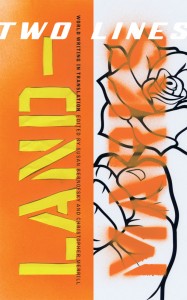
We also have a journal of translation (in addition to publishing books) called TWO LINES, not something that most translation presses can boast. For 20 years has been published annually, and starting in Fall 2014 it will publish twice-yearly. The journal has worked with a lot of the best people in translation, and I do think it’s a pretty special thing to have on with us.
Then there’s the fact of our literary aesthetic. Most translation-only presses are such small, intimate operations that the prejudices of the staff and their tight circle of translation friends really shines through. I don’t think it’s too much of an exaggeration to say that we have our own particular take on what constitutes “great literature.”
And maybe one more thing: we have our own podcast called That Other Word that I cohost with the incredible Daniel Medin of the Center for Writers and Translators at American University in Paris. We do a 15-minute segment of new translation recommendations and then a 45-minute interview with a translation professional. Past guests have included Ngugi wa Thiong’o, Lorin Stein (of The Paris Review and FSG), Ethan Nosowsky (of Graywolf), Sylvia Whitman (of Shakespeare & Co in Paris), Margaret Jull Costa, Petra Hardt (of Suhrkamp).
JL: It seems that there’s been a renewed interest in translated works in recent years and more publishers concentrating on bringing more unknown works to the US. Does this seem to be the case for you? And if so, why do you think this is?
SE: It’s possible—Chad Post tracks the number of fiction translations published each year, and the number has been increasing over the past few years. Although, it is hard to tell if this is a trend or an aberration right now. (For instance, that number was bumped up significantly by the creation of AmazonCrossing, which accounted for nearly 10% of the total in 2012, but those books were largely horrible titles that have no literary value, and it looks like Amazon is now backing off of publishing.)
But definitely there is more of a conversation around translation, and more of a sense of shared mission and solidarity among the people in the community. You can ascribe some of that to the community-building enabled by Internet technologies, and initiatives like the PEN World Voices Festival or the Best Translated Book Award.
But, in my opinion, the most significant reason for any renewed interest in translation is because this is where a lot of the literary innovation is occurring these days. There are kinds of fiction available in translation that are simply not produced here in the U.S. When I think of titles like Blinding by Mircea Cartarescu, Karl Ove Knausgaard’s My Struggle sextet, the work of Roberto Bolaño, Hilda Hirst, Laszlo Krasznahorkai, just to name just a few recent examples, it’s very clear to me that fiction like that is not being written by American writers.
As serious writers and readers here in the U.S. have become interested in having new experiences and expanding their artistic horizons, I think it’s been a very natural thing to look abroad for new influences.
SE: For me, the biggest pleasure is the privilege of being among the first to read some of the best of the best literature from all around the world. Editing at a translation press is like having people hand-pick the very best books they can find from all over the globe and then deliver them to you. That’s an amazing position to be in.
One thing that’s both a challenge and a pleasure is working with translators. It’s a pleasure in the sense that translators are some of the most articulate, knowledgeable, passionate book people I’ve ever met. Getting to correspond with them daily and hang out with them at conferences and such is such a treat, and it’s made me a far better reader, writer, and person. Working with them is a challenge in the sense that you have to develop a different set of editorial practices in order to work with a translator, as opposed to directly with the author. It can be tricky to edit and evaluate something when you’re actually reading someone’s interpretation of an original text. This is even more of a challenge when you consider that in translation there is never any “right” answer—on each page you are forced to choose the best compromise among a host of options with their own pros and cons.
The other challenge is strictly practical: translations come with their own particular expenses, we’re often reliant on readers to report on books for us, and, despite gains, it still is hard to market translations and get press attention for them. All of that makes it a lot harder to stay above water (one of the reasons we are a nonprofit).
SE: As a huge fan of Laszlo Krasznahorkai, I can’t help but anticipate another Krasznahorkai title that Ottilie Mulzet is working on right now (she’s the one who did that incredible, incredible translation of Seiobo that just came out this fall). It’s called Destruction and Sorrow beneath the Heavens and it will be appearing with Seagull Books, one of the most interesting translation presses to come on the scene in recent years. For a preview of this title, you can read more about it in Issue 2 of the journal Music & Literature. (I’m also pretty sure Ottilie discusses it in an interview I conduct with her in the same issue. If not, read it anyway—her discussion of Krasznahorkai’s career should be a no-brainer for any fan of his work.)
Open Letter is set to publish two books by the Chilean author Carlos Labbé: Navidad & Matanza and Locuela. I’ve read the latter in Spanish and the former in English, and I think Labbé has huge potential to be one of the best recent discoveries from Latin America.
NYRB Classics is doing this giant selection of Balzac’s short stories, which I am hugely excited about. I am an unabashed Balzac fanatic, a person who thinks every creative writing student in the country should read his best work and try their best to achieve even 1/8th of his magnificence. Any time I see a Balzac translation that I do not own, I immediately buy it, and then I read it. So 400 pages of mostly untranslated stuff is a blessing.
As a big fan of Edouard Levé, I’m excited to see that Dalkey Archive is publishing his Works in 2014. This title consists of a list of his potential literary projects. And there is also Melancholy II by Jon Fosse. The first volume of Melancholy was one of the darkest, toughest, most Bernhardian texts I read in 2013.
My colleague CJ Evans adds that he’s excited about the Henrik Nordbrandt title When We Leave Each Other forthcoming from Open Letter Books. He’s also looking forward to Grzegorz Wróblewski’s Kopenhaga, forthcoming from Zephyr.

SE: Of course! Next year we are doing a remarkable book called Baboon by one of Denmark’s leading authors, Naja Marie Aidt. It’s a series of utterly bizarre short fictions, each of which just keeps accelerating until it achieves this kind of demented headlong force. Reading the book as a whole is kinda amazing. As I read each fiction sequentially, my eyebrows kept raising higher and higher until I think I strained a muscle. She really achieves this strange aesthetic territory that is wholly her own, insofar as I can tell.
Then after that we are doing this book called Self-Portrait in Green by Marie NDiaye, which is a completely absurd “memoir.” NDiaye claims that this book is about herself, but it has dead women roaming around it, all these “women in green” who keep popping up and freakishly menacing her, a section where she visits her estranged father in Africa that I’m still not totally sure whether is a dream or not. It’s a really crazy, extraordinarily well-written (and extraordinarily well-translated) re-imagining of what a memoir is.
SE: I guess I’d just like to say that if you are one of those people who loves translation and loves the presses that publish translation, then take a moment right now to purchase a subscription to one of them. I can’t tell you how happy you will make that press. As a publisher, subscriptions are just about the best thing ever. Not only is it great to know that readers put that much trust in our editorial vision, but it’s also really, really helpful on a purely practical level: knowing that we have a list of people who have already signed on to purchase our books no matter what really frees us up to not think about sales to such a large extent and to do the really risky projects. So whether it’s us or Archipelago or Open Letter or And Other Stories or whomever, get that subscription.
Scott Esposito is the co-author of The End of Oulipo? (Zero Books, 2013) His work has appeared in the Times Literary Supplement, The White Review, Bookforum, The Washington Post, The Believer, Tin House, The American Reader, Music & Literature, and numerous others. He edits The Quarterly Conversation and is a Senior Editor with TWO LINES.
December 10th, 2013 / 11:35 am
POEM-A-DAY from THE ACADEMY OF AMERICAN LUNATICS (#8)
The Dying
by Nina Gagen-Torn
What does it mean—exhaustion?
What does it mean—fatigue?
Every movement is terrifying,
Every movement of your painful arms and legs
Terrible hunger—Raving over bread
“Bread, bread,” the heart beats.
Far away in the gloomy sky,
The indifferent sun turns.
Your breath is a thin whistle
It’s minus fifty degrees
What does it mean—dying?
The mountains look on, and remain silent.
When I’m not drafting up posts about “positivity” (for  and against) I like to read books like Gulag by Anne Applebaum. The 16th chapter of Gulag begins with this poem. (I am staring out now at the sky). Proximity to death, in Art or in life, fills my veins with a kind of icy fire.
and against) I like to read books like Gulag by Anne Applebaum. The 16th chapter of Gulag begins with this poem. (I am staring out now at the sky). Proximity to death, in Art or in life, fills my veins with a kind of icy fire.
note: I’ve started this feature up as a kind of homage and alternative (a companion series, if you will) to the incredible work Alex Dimitrov and the rest of the team at the The Academy of American Poets are doing. I mean it’s astonishing how they are able to get masterpieces of such stature out to the masses on an almost daily basis. But, some poems, though formidable in their own right, aren’t quite right for that pantheon. And, so I’m planning on bridging the gap. A kind of complementary series. Enjoy!
December 7th, 2013 / 7:50 pm

